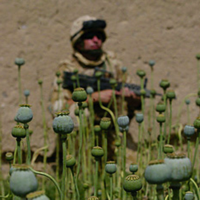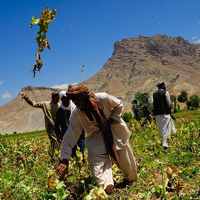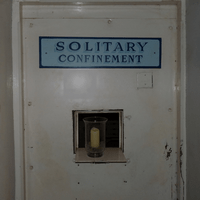Increased U.S. funding to fight drugs and organized crime in Mexico and Central America has attracted a good deal of attention in recent years. But flying largely under the radar is the growing role being played in that effort by the U.S. military, most notably now in Honduras, where U.S. Marines are engaged in a joint training exercise with Honduran troops and the Pentagon is financing a new naval base. “There’s been a noticeable uptick in U.S. military aid and cooperation in Honduras during the past year,” says Adam Isacson, senior associate for regional security policy at the Washington Office […]
Crime Archive
Free Newsletter

On Sept. 26, deep inside Taliban-controlled territory in Afghanistan’s Helmand province, Afghan counternarcotics agents backed by their Australian counterparts seized and destroyed $350 million worth of illegal narcotics. The operation set a record for drug seizures in Afghanistan, according to the U.S. Drug Enforcement Administration. Two weeks earlier, the same authorities busted the largest heroin-producing facility found in Afghanistan since 2006, capturing drugs worth $150 million if sold in the U.S. Both operations took millions of dollars from the pockets of insurgents who might otherwise use the money to buy weapons and ultimately mount narco-terrorist attacks inside Afghanistan. But a […]

In a speech at the Center for Strategic and International Studies (CSIS) in Washington last Friday, Viktor Ivanov, the director of Russia’s Federal Drug Control Service (FSKN), laid out an ambitious agenda for increased Russia-U.S. cooperation in several counternarcotics areas, characterized by “new thinking” on a variety of issues. Ivanov, who stopped in Washington after attending the fifth meeting of the Counternarcotics Working Group of the U.S.-Russia Presidential Commission in Chicago, proposed creating an integrated command for counternarcotics efforts in Afghanistan that would include representatives from the FSKN, the U.S. Drug Enforcement Administration and the NATO-led International Security Assistance Force […]

In July, a group of prisoners in the Security Housing Unit (SHU) of California’s Pelican Bay State Prison went on a hunger strike to protest their conditions of confinement. Central to the prisoners’ complaints was the fact that for years and, in some cases, for decades, they have been held in prolonged and indeterminate solitary confinement with few privileges and opportunities to engage in productive programming and activities. Importantly, as one prisoner put it in a letter to the informational website Solitary Watch, they were asking for “human justice, . . . fairness, compassion, positive reform, dignity . . . […]
Police in Brazil recently purchased several unmanned aerial vehicles to monitor environmental crimes such as deforestation and illegal fishing. In an email interview, Tyler Wall, a professor of criminal justice at Eastern Kentucky University, discussed the nonmilitary uses of drones. WPR: What are some of the potential nonmilitary applications of drones? Tyler Wall: Unmanned Aerial Vehicles (UAVS) are being deployed in a variety of nonmilitary spheres, albeit in limited capacities. Examples include the use of drones for domestic policing and border patrol; natural-disaster assistance; and monitoring wildlife, crops and the weather. WPR: To what degree are these potential uses being […]

On Oct. 31, the global population was estimated to have reached the 7 billion mark. On the eve of that momentous day, Li Bin, director of China’s State Population and Family Planning Commission, announced that China would retain its one-child fertility policy to do its part to slow world population growth. This news will have come as a bitter disappointment to the Chinese demographers and policymakers who have been calling for a relaxation of the one-child policy for several years. Wang Yuqing, the deputy director of the Chinese People’s Political Consultative Conference Committee on Population, Natural Resources and the Environment, […]
Iranian President Mahmoud Ahmadinejad has faced growing criticism from the Iranian parliament regarding an ongoing banking scandal. In an email interview, Farideh Farhi, a researcher on Iran at the University of Hawaii at Manoa, discussed the Iranian banking scandal. WPR: What is the background of the ongoing Iranian banking scandal? Farideh Farhi: The background to the banking scandal is a combination of outright fraudulent activities, policies that have encouraged loose lending practices and speculation, and political cronyism that has allowed the use of borrowed money to gain control of recently privatized companies. The scandal came to light when it was […]
In the border town of Nuevo Laredo, a stronghold of the powerful Los Zetas cartel, the body of a Mexican blogger who had reported on the activities of drug cartels was found decapitated next to a monument in the center of town. The execution was apparently meant as a stark warning to those who would use the Internet to fight back against the crime and violence perpetuated by the cartels.
The recent revelation that the Drug Enforcement Administration is operating several militarized commando squads in Latin America signals an apparent U.S. eagerness to begin using covert counternarcotics strategies honed in Afghanistan over the past decade in the Western Hemisphere. The DEA’s so-called FAST team program — Foreign-deployed Advisory Support Teams — was reportedly created during the Bush administration to investigate Taliban-linked drug traffickers in Afghanistan. While their deployment now to Honduras, Guatemala, Dominican Republic, Haiti and Belize signals a new development, in some ways it actually represents a return to the program’s historical roots, which can be traced back to […]
A hostage situation at Venezuela’s Tocuyito prison ended last month when authorities agreed to transfer hundreds of prisoners to another facility. In an email interview, Chris Birkbeck, a specialist in criminal justice in Latin America at the University of Salford, discussed South America’s prison systems. WPR: Broadly speaking, what are the major problems facing the prison systems in South America? Chris Birkbeck: The biggest problem is the lack of control over inmates inside each establishment. Internal, often coercive, control is in the hands of prisoners, in some cases with the tacit recognition of the administration, but it is often contested […]
The number of pirate attacks off the coasts of Benin and Nigeria has reportedly dropped recently due to joint patrols by the two countries. In an email interview, Martin N. Murphy, senior fellow at the Atlantic Council’s Ansari Africa Center, discussed West African piracy.* WPR: What is the recent history of piracy off West Africa? Martin N. Murphy: Piracy has been a serious problem off Nigeria since the 1970s. Back then it was concentrated around the port of Lagos, where ships often sat at anchor for months waiting to unload. This came to an abrupt end in 1981 when the […]
